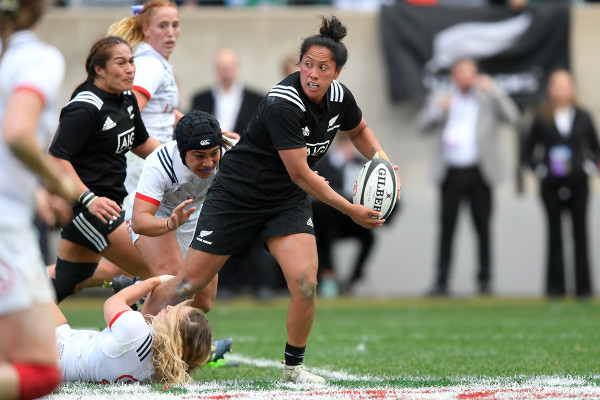Male builders wolf whistling women may seem like a movie cliche, but builder Aroha Savage says it happens all the time and is just a small part of the sexist culture of the worksite.
As a builder and a semi-professional rugby player, Aroha Savage has experienced the sexism of male-dominated industries firsthand.
She’s found a good crew in Northland now, but she said during her builder training in Auckland there was always a small but vocal group of sexist men on site.
“The way they talk about women is so degrading. I felt really uncomfortable being around that,” she says.
“These men are just so immature. They even whistle at girls on site, which I found so annoying.”
But Aroha felt powerless to do anything about it because she was often the only woman on site, so had no one to discuss it with, and didn’t want to raise it with her employer for fear of losing her job.
“I was determined to finish my certificate so I just put up with it. But that shouldn't be the way.”

Aroha Savage (centre) in a 2018 Black Ferns vs. USA game in Chicago, Illinois. Credit: Icon Sportswire / Getty.
Sexism and racism are rampant on site
Women make up less than 12% of trades jobs in Aotearoa.
Workforce Development councils Waihanga Ara Rau and Hanga-Aro-Rau recently conducted research to find out what is keeping women away from these jobs, which are often well paid and in high demand.
Their research found many women in these workplaces experience sexism, racism, harassment, and bullying, and this has kept other women from wanting to pursue these careers.
Around 30% of people surveyed had experienced sexual harassment and racism in the last five years, and 69% had been subjected to harassment or bullying.
Seventy-three percent of these bullies were men.
Their research also found women aren’t attracted to these workplaces because they feel like they aren’t designed with them in mind - lacking basic facilities like women’s toilets or menstrual product disposal bins.
A lot of women surveyed saw these worksites as male clubhouses, where men wolf whistle women, and hang posters of naked women on the walls. As Aroha can confirm, this is still often the case.
‘Keep it decent’
Deputy chief executive of Hanga-Aro-Rau Samantha McNaughton says the trades have a massive skills shortage that can only be filled by welcoming more women into the industry.
And to do that, the culture of the industry needs to change.
“We’ve found some women have quite horrific experiences [in the trades]. It’s absolutely not OK. It's 2022. It is critical that everybody, no matter their gender, race, or age, feels safe, respected and included in the workplace.”
To address this, the two workforce development councils have developed Keep it Decent: Guidelines for Safe and Respectful Workplaces.
McNaughton says their research found many employers want to make their sites more welcoming to women but don’t know how to do it.
These guidelines lay out ways for employers to create a more inclusive work environment, and deal with instances of bullying or harassment.
“[Employers] have to be firm about the culture they want in their workplace, and what is acceptable and what is not,” McNaughton says.
“It’s up to everyone to make a change. It’s on the workers, the industry itself, and the employers.
“We are calling on employers to pledge to keep it decent. Try the tools, let us know how they work, reach out if they hit obstacles. We have to do this, and we can only do it together.”
More stories:
HIV is not a death sentence. Why are we still scared of it?
In the past decade, things have completely changed for HIV.
11-year-old student says educational tool reinforcing harmful stereotypes
“It’s a privilege having control over a corporation or school – use that to make an impact.”
‘My heart beats for Iran’: The grief, rage and hope of Iranian NZers
"We won’t stop until Iran is free."